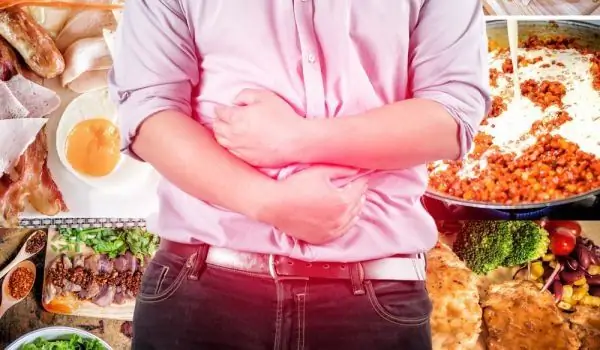2025 Author: Jasmine Walkman | [email protected]. Last modified: 2025-01-23 10:18
In the season of overeating, we can not ignore the destructive damage that excessive amounts of food cause to our body. So before you reach for just one more bite, it's a good idea to understand what happens to our digestive system when we consume too much food, The Independent reports.
The stomach is a muscular sac that is located in the abdomen. When empty, it is usually no bigger than a fist. However, it has the capacity to expand and reach a much larger volume. It also produces acid to digest food well.
Once the food has passed through the stomach, it goes to the small intestine, where digestion continues and the broken down nutrients are absorbed into the bloodstream. The small intestine connects to the large intestine, where only water and salts are sucked in, and the remains are discarded.
You may have wondered why the feeling of hunger goes straight to the feeling that you are full to the brim without feeling anything in the middle. This is because there is a delay until the signals from the full stomach reach the brain.
Our body has a very complex way of communicating to us when we are hungry or full, requiring a number of hormones that are produced in response to the presence or absence of food in the digestive system. If we have consumed the right amount of food, we experience a feeling of satiety - fullness that suppresses the desire to eat.

Two of the most important hormones are ghrelin and leptin. Ghrelin increases appetite and leptin reduces it. They are produced mainly in the stomach and fat cells. Ghrelin usually has its highest level before we eat, and then begins to decline. Leptin tells the brain that we are full. It can be assumed that people with more fat cells will produce more of it and therefore will want to eat less, but this is not the case. Obese people develop resistance to leptin, which means they need to produce more to have an effect and reduce appetite.
Here are some things to keep in mind when reaching for extra food.
It can take food in only two ways - to continue through the digestive system or to return to where it came from, in the form of vomiting. Overeating leads to indigestion and heartburn. The body has to divert a lot of its energy to digest food, which makes us feel tired and sleepy.
The stomach can burst from overeating. Cases have been reported in which the stomach is so full that a perforation occurs and urgent surgical treatment is required.
Overeating can cause death. It is very rare, but it has happened because of a ruptured esophagus or stomach.
Recommended:
What Happens To The Body When You Drink Green Tea?

Drinking green tea is an integral part of the Japanese tradition. However, in recent years, its consumption has become popular in the West, as the wonderful ones have been discovered properties of green tea . The contribution that this drink can have to our health and body is endless.
What Happens To Your Body After Drinking A Cup Of Coffee?

Coffee is one of the most popular drinks around the world. Many people can't start their day without a glass of aromatic drink, but what actually happens to our body when we drink our coffee? In the following lines, see how coffee affects our body.
Eat 6 Cloves Of Garlic And See What Happens To Your Body In 24 Hours

And for a moment you should not neglect the power of garlic when we talk about our health. 24 hours after consuming garlic in diets for weight loss or as a natural remedy for certain diseases, our body responds to this powerful food. Here is what will happen to our body if we eat 6 cloves of roasted garlic.
What Happens In The Body When You Drink Coffee?

The coffee ranks first among the world's favorite drinks. The morning glass with aromatic liquid is a ritual known to people all over the world. Lovers of enchanting taste do not forget to start their day with their favorite invigorating cup of coffee, and many of them are not satisfied with just the obligatory morning dose.
Do Not Eat Fruits And Vegetables? Here's What You're Doing To Your Body

We know that fruits and vegetables are the most useful products that we need to feed the body. They are the basis of a healthy diet, a way to stay in shape and be healthy. They are good to dominate the menu, but if for some reason you do not consume enough of them, be alert to some of the following problems.

